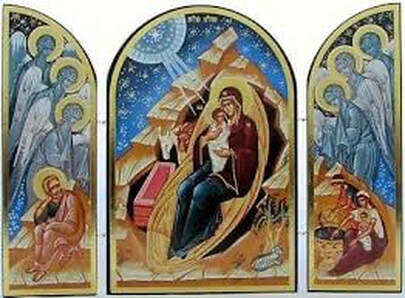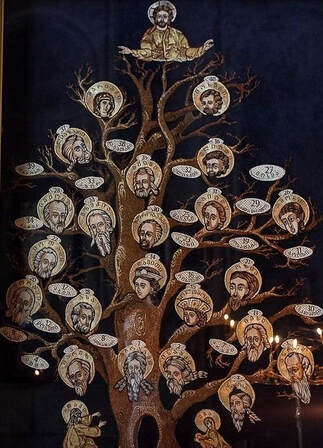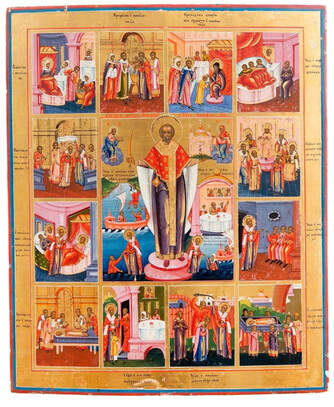 Today we remember, we witness, a most wonderful event. Two deeply, devoted, prayerful people, in a remote corner of Bethlehem, are preparing for the birth of a child, in a cave used to keep animals, because there is no room elsewhere, amongst Joseph’s relatives. And this is the amazing thing; a strange and wonderful mystery: the cave is Heaven, the woman, the Virgin Mary, a descendant of King David whom he describes as the Queen clothed in an embroidered mantle of gold (Psalm 44), becomes the cherubic throne, only occupied by God Himself. In the humble manger, now filled with fresh straw, has become the noble place, where reposes Christ, the uncontainable God. In the silence of the night with no-one except a few of Joseph’s relatives aware of this, is a significant event which will change the world. The world is still and silent apart from the noise of those gathered for the Great Census required of them. But there are witnesses, shepherds who are outcasts of society, never in the Synagogue, always out in the fields watching and guarding their flocks, undoubtedly unwashed and enveloped with the scent of sheep and goats. They are unable to be welcomed into society at large but are honoured to be the first called to see the is wonderful event. We are privileged to stand with them, as we recall the hymn, “What can I give you, poor as I am, if I were a shepherd, I would bring a lamb, if I were a rich man, I would play my part ... but such as I have, I give you, give you my heart”. And what is this great event we have come to witness? Who is this lying in the manger? None other than the Word of God who destroys the sins of mankind, who brings freedom and new life to the world and to mankind. The one who has put on the garment of our nature, born to renew the likeness that had been lost of old. Through the Virgin Mother Mary, the Lord God, has taken on the flesh of mankind, our flesh, to fully reveal himself as our God and Saviour in order to unite us to Himself. This Mystery, this action of God, was hidden from the leaders of Israel, who were now far astray. If only they had understood psalm 115 which they undoubtedly read frequently: “They (who have misunderstood the nature of God) have idols of silver and gold made by human hands. They have mouths but speak not, eyes that see not, ears that hear not, noses that smell not, hands that cannot feel, feet that cannot walk...... (And).... Their makers are like them and all who rely on them are also like them!” Eyes and ears closed! Even we can forget that our understanding of God may be self-made, world-made, even, church-made and we are pulled away from true understanding, we too rely on ‘idols’. In this Holy Season, we pray that there may be a return of true understanding with eyes, ears and mouths, to acknowledge and praise; for God is now with us, the child in Bethlehem; more closely to us now than ever; He is on earth with us, our God and our Life. “...such as I have, I give ... my heart.”. As we go forth, this Christmas, with the fullness of gratitude for the gift of Christ’s birth, we take the advice of St Pophyrios, “We must plug our heart into His love and be united with Him” This is the gift of Christ’s birth; God gives us His Son and asks what in return? LOVE. If St Nicholas, Santa Claus, visits us this night, and we hope that he will. We pray that our chief gift will be this: to have eyes which see, ears that hear and understanding that is enlightened, so that “We may plug our heart into His love and be united with Him” May you all have a most joyful and blessed Christmas for Christ is Born, glorify Him! Fr David
0 Comments
 Today we celebrate the memory of the Ancestors of Christ. Christ the Word, to be the Anointed One (Messiah) in due course, was present throughout the whole of Old Testament history, and we praise Him because he has magnified His ancestors amongst all nations and commends them to us. Yet, His genealogy is not of saints, though some were. In Matthew’s gospel, which we read today, the list begins with Abraham whose great faith in God sets the wheels of Salvation in motion. He was the Great Ancestor followed by many others and yet there are some surprising inclusions. Usually, in Jewish tradition, only men were mentioned in the list of ancestors but here are three women; Tamar is included even though of a life of doubtful virtue; amongst the men, King David is one of the great ones and yet the genealogy states, ‘David your King begat Solomon by her (Bathsheba) who had been the wife of Uriah’. Yes, David had Uriah murdered so that he could take Bathsheba as his wife. A great king, yet also a murderer and an adulterer. Yes, a great prophet, a sinner, but also, he is an example of a sincere repentant sinner as his psalm 50, which we use daily, clearly acclaims. The genealogy mentions gentiles and sinners with many imperfections and yet flowing with God’s graciousness and emphasising the importance of women by their inclusion, indeed the inclusion of all In the blessing given in this list of ancestors, Our Lord emphasises the ordinariness of His origin as well as who are special in the service of God, for the Supreme Ancestor from this lineage, is Mary, herself, His mother, His birth-giver. She, as a result of this ancestry, was the spotless handmaid, the undefiled one who could bring about God’s saving plan. From her, Christ, the Anointed One, came forth to give life to us all, bearing the name, Jesus, which means, ’O Lord save’. Added to this genealogy of ancestors of varying fidelity, Our Lord is born in a stable, laid in a manger full of hay, surrounded by sheep, in as lowly surroundings as possible. By His very birth and His ancestry, He demonstrates the graciousness of God who accepts all in His love and with utmost desire that we all return to Him and accept the sonship and daughterhood which He so freely gives. What a sadness that our nation has fallen so far away from its Christian foundations and stands, so much, in denial of God’s benevolence, without recognising that there is only fullness of Life in God our creator. With this also, is the strange denial of death, not only because it is not wanted but there is also a denial that anyone will return to, and receive God’s loving provisions, even when earthly life comes to an end. I wonder if this is the Sin against the Holy Spirit, which Our Lord mentions as unforgivable; there is certainly a denial that it is in the Holy Spirit that we live and move and have our being and a wilful hardness of heart to accept His existence. It seems the established Church in this Land, often plays into this; the funeral service is so often a celebration of the deceased’s life rather than a prayerful commendation of him/her as one who has fallen short, and who needs the mercy and forgiveness of God and is commended into His loving care. Fortunately, in our Orthodox Tradition, we only mention aspects of the person’s earthly life in the funeral oration whilst the whole of the funeral service is an appeal for God’s mercy and a commendation into a life beyond, “Give rest, O Christ, to the soul of thy servants with the saints, where sorrow and pain are no more, neither sighing, but life everlasting.” (Kontakion of the Dead). So here is the good news, the Gospel for today. Whatever our origins, the origins of our family and the fidelity of its forebears, we have been enrolled into the gracious salvation of God through our Lord Jesus the Christ, the one who saves, the Anointed One. We are within the Church where men and women are equal, where gentiles are welcome, where there is no sin which separates us from God (unless there is sin against the Holy Spirit, a denial of the divine activity of the Spirit by wilful hardness of heart), and if faithful, we have a guaranteed place in Paradise. And so, we go forward, in our preparation for the Feast of the Nativity, standing with the Ancestors of Christ, standing with His Holy Mother and Joseph to whom she is betrothed (married) and standing with great blessing. Through faith, You have justified Your Ancestors, O Christ our God; and through them, you have espoused in advance the Church set apart from the Gentiles. The saints rejoice in glory because, from the seed of these Ancestors, has come froth the glorious fruit, who gave you birth without seed. Through their intercessions, O Christ God, save our souls! (Troparion of the Ancestors) Fr David Do you watch ‘Only Connect”? Can you work out what the connection is between these four clues and why? The answer is Superheroes. All of these images portray the reason why specific comic book characters became their superhero personae. Peter Parker (Spiderman) was bitten by a radioactive spider, Clark Kent (Superman) was from the planet Krypton, Steve Rogers (Captain America) was enhanced to the peak of human ability by an experimental serum and Bruce Wayne (Batman) swore vengeance against criminals after witnessing the murder of his parents). If we look at the concept of a ‘Superhero’ we are likely to conclude that this is any kind of fantasy/science fiction crime-fighting character, often with supernatural powers or equipment and most often found in popular children's and fantasy literature. However, if we look at the concept of a ‘Hero’ we are likely to deduce that these are real or mythical person of great bravery who carrys out extraordinary deeds. Our Christian heritage is filled with Superhero-hero’s. ‘Superheroes’ by virtue of possessing supernatural powers and ‘Heroes’ because they are real and not fantasy characters. All who exhibit extraordinary courage. The root of the word ‘courage’ is ‘cor’—the Latin word for heart. today, courage is synonymous with being heroic. However, in one of its earliest forms, the word courage had a very different definition to todays. Courage originally meant “To speak one’s mind by telling all one’s heart.” I think it is fair to say that we have pretty much lost touch with the idea that speaking honestly and openly about who we are, about what we’re feeling, and about our experiences (good and bad) is the definition of courage. We often see ‘Heroics’ as putting one’s life on the line, but I want to suggest that being courageous and heroic can also be about putting our vulnerability on the line. In today’s world, that can be pretty extraordinary. In our gospel reading, Luke 13: 10-17, we witness heroism; we witness that of the ‘woman who had a spirit of infirmity for eighteen years’ (v11). Vulnerable, bent over and could ‘in no way raise herself up (v11} yet this woman still went to the synagogue on the sabbath, her bodily infirmities did not prevent her from participating in public worship – Heroic! We witness too the Heroism of our Lord. Having spoken out previously about the hypocrisy of the Jewish authorities Jesus is vulnerable and yet he continues to attend and teach in the synagogue on the sabbath. Again, he challenges the indignant Jewish authorities and calls the ‘ruler’ of the synagogue a hypocrite (v15). Our Lord sees that it is not only the woman who has the infirmity. Those who are challenging Jesus are under a spirit of infirmity; they have distorted hearts; they are unable to raise themselves up to God and heaven. We should note that our Lord, in his compassion, offers healing to the woman without it being sought or requested (v12). Although she could in no way raise herself up, Christ could lift her up and enable her to lift up herself. She that had been bent was immediately made straight (v13). So often we fall and judge others only according to outward appearance. Not so our Lord; he knew fully the enmity that was felt both to him and his gospel! – And His adversaries knew they were wrong, ‘And when He said these things, all His adversaries were put to shame’ (v17). The shame of his adversaries was the joy of his followers ‘and all the multitude rejoiced for all the glorious things that were done by Him’. They rejoiced in his Heroism.  Today we celebrate the feast of St Nicholas. As Bishop of Myra in Lycia, Nicholas was imprisoned for his faith under the Roman emperor Diocletian but freed by his successor Constantine. It is reported that on his way to the council of Nicea he performed a miracle, bring back to life three murdered boys. Further reported miracles involve him appearing in a vision or a dream to free three condemned man or to save three storm-bound sailors. And of course, his most famous act was giving three sisters dowries, as they came of age, to save them from prostitution or slavery. St Nicholas was and is still heralded by many as a healer of the sick, the liberator of captives, the treasure of the poor, the consoler of the afflicted and a guide to travellers. The feast of St Nicholas is surrounded with a special solemnity and his life with Heroism, He is truly one of the truer Heroes of the Orthodox faith! |
Parish Blog
This mainly contains homilies and messages from our priests, although there is some scope to share thoughts and interesting articles which we may want to share with others Archives
October 2022
Categories |

 RSS Feed
RSS Feed